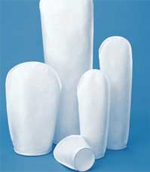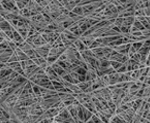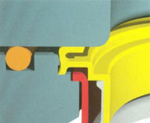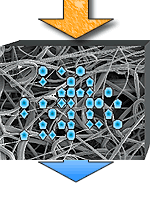Bag Filter Systems are used for the removal of particles from liquids.

Modern manufacturing technology has resulted in a proliferation of filter bag designs, but unfortunately, they all tend to look similar and pricing is often a major factor in the decision process. We only stock the best quality and the most efficient filter materials available.
Filter bags are installed within filter housings, a pressure vessel that directs the process flow through the filter media to remove unwanted particles. Filter bags are designed to be thrown away after use, attempting to clean and reuse them is not recommended. Bag Filter Vessels are available in Single or Multi Bag units. Multi Bag units offer large surface area and high flow rates. The filter bags have a comparable long life and require little maintenance when sized correctly.
We offer a full range of Filter Bags with over 1500 choices in all. From economical sewn filter bags for standard applications to welded, multi-layered bags for demanding applications.
Need Assistance?
Phone: +61 (0) 7 3889 9949 to discuss your application with our technical staff or,send details of your application to sales@monarchindustrial.com.au

The physical structure of filter bags cane placed into three categories, Mesh, Needle-felt and Melt-blown. The manufacturing technique for each category determines the materials of construction that can be used.
Needle-felt filter bags are generally the least expensive style and are the most common with mesh styles being a little more expensive mostly due to the materials compatible with the required manufacturing process. Melt-blown and multi-layered filter bags are the most expensive but also provide higher efficiencies.
Need Assistance?
Phone: +61 (0) 7 3889 9949 to discuss your application with our technical staff or,send details of your application to sales@monarchindustrial.com.au

In addition to the material and manufacturing process, filter bags have a sealing ring designed to prevent particulates from bypassing the material. The sealing ring thus provides a seal between the filter bag and the vessel. The most common sealing ring designs are a "Snap Ring" and a "Plastic Crush Seal Ring".
A snap-ring is a metal or plastic ring sewn within the opening of the filter bag, which aligns with a groove within the filter bag housing. Based upon the tolerance of the groove and ring, the filter bag is held firmly in-place yet can be removed by hand for change-outs; filter bags have handles to grab so they can be lifted from the vessel.
A crush-seal ring is a geometrical shaped plastic ring that also has an outer diameter that "snaps" into the support basket groove. Sealing is further enhanced by downwards pressure onto the top of the sealing ring, which creates an outward force and improving the seal between the ring and sealing grove. The downwards pressure is achieved by the filter vessel cover, either directly or via a hold-down ring to transmit the downwards force of a closed chamber cover to the top of the filter bag.
Need Assistance?
Phone: +61 (0) 7 3889 9949 to discuss your application with our technical staff or,send details of your application to sales@monarchindustrial.com.au

Nominal vs High Particle Removal Efficiency
Our range of filter bags can categorised into Nominal or High Efficiency Particle Removal.
Nominal Ratings
Nominal filter ratings are an arbitrary (nominal) value, indicating a particulate size range at which the filter removes some percentage. Nominal ratings vary from manufacturer to manufacturer and cannot be used to compare filters among manufacturers. Processing or application conditions such as operating pressure, concentration of contaminant and particle type have a significant effect on the retention efficiency of the nominally-rated filters.
Absolute Ratings and High Removal Efficiency
Absolute filter ratings are a value associated with a filter, that represents the size of the smallest particle completely retained. Complete retention is within the experimental uncertainty of a standard test method consistent with the intended filter use. Among the test conditions that must be specified are particle size, challenge pressure, concentration, and detection method used to identify the contaminant.
Need Assistance?
Phone: +61 (0) 7 3889 9949 to discuss your application with our technical staff or,send details of your application to sales@monarchindustrial.com.au
Monarch Asia Pacific Pty Ltd, Copyright © 2025 All Rights Reserved
Release: 24:8:2




